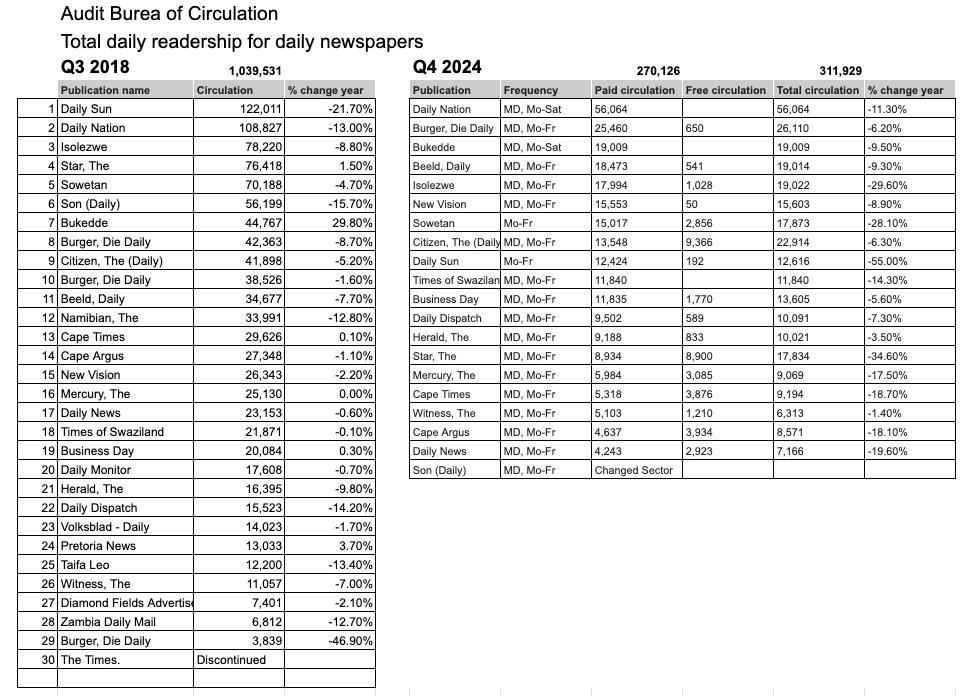It’s the ultimate election year, in which more than two billion people are going (or have already gone) to the polls around the world, in at least 64 countries. At a time when media houses traditionally would beef up their newsrooms, jobs are being shed at an alarming rate, threatening the business of media and ultimately, democracy.
While press freedom is taken for granted in many of these countries – including South Africa, the United Kingdom and the European Union — it is held at gunpoint in others.
In Russia, Vladimir Putin has just been “re-elected” in a landslide election, in a vote that was neither free nor fair owing to censorship and the jailing and killing of political opponents. Pakistan, which has jailed popular opposition leader and former prime minister Imran Khan, wrapped up flawed elections in February. In Sudan, a third of the country’s 48 million face starvation due to civil war.
And in the United States, where voters will choose between Joe Biden and Donald Trump, The Economist has warned a Trump victory poses the biggest danger to the world in 2024.
The outcome of these national and regional elections will be felt for years to come.
The business of news nosedives
The South African media industry lost almost half its staff from 2008 during the global economic downturn to 2018, with the demise of high-profile media organisations such HuffPost SA, Finweek and Afro WorldView (formerly ANN7), as well as the loss of more than 375 community print newspapers in 2008, says Associate Professor Glenda Daniels, citing the State of the Newsroom reports from 2013 to 2019.
In 2020, two magazine publishers – including Associated Media Publishing, founded by Jane Raphaely in 1982 – and about 80 community publications folded, and there were significant job losses at Media24, Independent Media, Tiso Blackstar, Primedia and e.tv/eNCA. That year, the SABC announced it would slash 400 jobs.
Read more about the state of the South African media here.

Daniels writes that these losses in the newsroom signify a diminishing diversity of voices and therefore, democracy. “A loss is also experienced when senior journalists – those older than 40 – are retrenched (a trend all over the world, not just in South Africa) in favour of content producers and those who can do video or high-techy things.”
Another casualty is beat reporting, which is disappearing worldwide, owing to corporate and commercial pressure to go digital and competition from social media, she says.
South Africa is not unique: Before Covid, newsrooms around the world were already under strain, forcing media houses to slash costs, lay off staff, and reduce output.
An Open Society study of the impact of the global financial crisis on media and news delivery to citizens of 18 post-socialist countries (Albania, Armenia, Bosnia and Herzegovina, Bulgaria, Czech Republic, Estonia, Hungary, Kyrgyzstan, Latvia, Lithuania, Macedonia, Moldova, Montenegro, Poland, Romania, Serbia, Slovakia, and Ukraine) found that media across the region lost between 30 and 60% of their income.
News organisations were forced to adopt cost-saving measures, including reduced volume, staff layoffs, scaled-down investigative reporting and cuts in international and provincial coverage. Foreign investors took flight, causing independent outlets to fold. The constraints and ownership changes resulted in an overall drop in the quality of news delivery, resulting in content that was “shallower, more entertainment-centred, increasingly isolationist, more prone to political and business influences and lacking in investigative bite”.
In February 2024, Fast Company reported a slew of job cuts in the US media: the Los Angeles Times was laying off 20% of its newsroom; NBC News and MSNBC had laid off around 75 a year earlier; Sports Illustrated lost most of its staff (about 100); Time cut 15% of its staff (30); Business Insider reduced staff by 8%; Forbes by 3%; the Wall Street Journal let 20 staff go; CBS News cut 20 jobs at its DC bureau as part of a larger round of 800 cuts at Paramount; and Vice Media laid off hundreds.
Cashing in
A free press is essential to a healthy functioning society and yet, the business of news has been in freefall for more than a decade, causing journalists to lose jobs in record numbers, as advertising shifts online to technology giants such as Meta (Facebook, Instagram and WhatsApp), Alphabet (Google and YouTube) and TikTok – all entities that are not tax residents of South Africa, which means their income tax on their local sales is paid in their country of tax residence.
At the Media and Digital Platforms Market Inquiry in March, Media24 CEO Ishmet Davidson told the inquiry that Google, not the government, was the biggest threat to media freedom in South Africa.
News24 was unprofitable, which was an indication of the unsustainable business model of SA news media organisations, Davidson said.
Citing statistics from the Independent Advertising Bureau, he said Google and Meta were “absolutely dominant with 97% market share, leaving publishers with the crumbs”.
Google/Alphabet denied at the inquiry that it reaped substantial revenue from news.
On Monday, 15 April, the company told Daily Maverick that, like other multinational companies, it paid a “very large amount of corporation tax”.
“As an international business, we pay the majority of our taxes in our home country (US), consistent with current international rules – as well as all the taxes due in South Africa.
https://www.youtube.com/watch?v=dMV39vJQxW8
“Our effective tax rate over the past decade has exceeded 20% of our profits, in line with average statutory tax rates. We have long supported reform of the international corporate tax system.”
For the fourth quarter last year, Alphabet’s revenue was $86.31-billion (a 13.49% increase year-over-year), $48.735-billion of which was profit (a 19.72% YoY increase).
A Meta spokesperson said: “We follow the international tax rules, and we pay all taxes required in each of the countries where we operate.”
Meta revenue for Q4 was $40.112-billion (a 24.71% increase YoY).
TikTok generated around $707-million in revenue from users worldwide.
‘Silicon Six’ accused of tax evasion
In 2021, the Guardian reported that the giant US tech firms known as the “Silicon Six” (Amazon, Facebook, Alphabet, Netflix, Apple and Microsoft) had been accused of inflating their stated tax payments by almost $100-billion over the previous decade.
Later that year, the US, Britain and other wealthy nations reached a landmark deal to “squeeze more money” out of these multinationals and reduce their incentive to shift profits to low-tax offshore havens, Reuters reported. The deal was described by then German finance minister Olaf Scholz as “bad news for tax havens around the world”.
But two years later, an EU Tax Observatory report found the global agreement, setting a global minimum tax of 15% and outlining ways that countries could collect that tax even from tax havens and non-cooperative companies, was already being undermined as firms were finding loopholes around the agreement to pay about half of what was originally expected.
While these tech giants rake in billions of dollars, paid into tax havens such as Bermuda, the Cayman Islands and Ireland, newsrooms are suffering because of cratering advertising revenue. As newspapers thin out, there is less space for news, resulting in a decline in sales of print media as more people switch to reading their news online. DM





